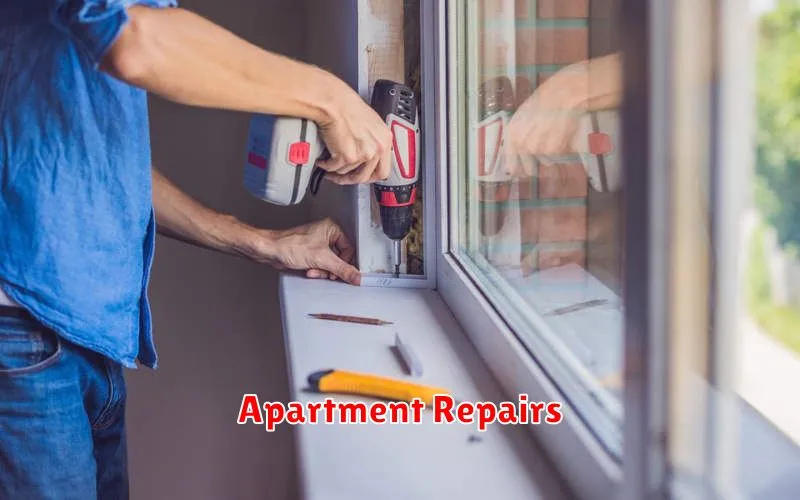Is your apartment starting to feel more like a fixer-upper than a home? Dealing with apartment repairs can be a frustrating experience, but it doesn’t have to be a nightmare. From leaky faucets to broken appliances, this guide will equip you with the knowledge and steps you need to navigate the repair process effectively. We’ll cover everything from communicating with your landlord to understanding your rights as a tenant, ensuring you get the repairs you need and deserve.
Identifying Necessary Repairs
Before contacting your landlord, take some time to assess the situation and identify what repairs are truly necessary. This will help you prioritize repairs, prevent unnecessary stress, and ensure your landlord is aware of the most critical issues.
Start by creating a list of everything that needs fixing. Be specific and detailed in your descriptions. For example, instead of simply writing “leaky faucet,” note the exact location of the leak, the severity of the dripping, and whether it’s affecting any other areas.
When identifying repairs, consider the following factors:
- Safety: Are there any hazards or potential dangers in your apartment? This might include faulty electrical wiring, broken stairs, or a leaky roof.
- Functionality: Are any essential appliances or fixtures malfunctioning? This could include a broken stove, a non-working heater, or a leaking toilet.
- Livability: Is the damage affecting your enjoyment of the apartment? This might include cracked walls, peeling paint, or a broken window.
While it’s important to be thorough, also consider what repairs are truly essential and which can wait. For example, a small crack in the wall might not be a priority compared to a broken heating system.
Communicating with Your Landlord
One of the most important aspects of being a tenant is knowing how to communicate with your landlord. This can be tricky, but it’s important to remember that you’re both trying to achieve the same thing: a safe and habitable living space. Being direct and respectful will go a long way in ensuring your requests are met.
Start by reviewing your lease agreement. It should outline the process for requesting repairs and the timeline for completion. Make sure you understand your rights and responsibilities. While you have the right to a safe and livable space, your landlord has the right to make repairs in a timely manner.
When you need to contact your landlord, it’s best to do so in writing. This can be done via email or letter. A written record of your request will help if there are any disputes later on. Be clear and concise in your request, detailing the problem, when it started, and any potential hazards it poses. Include photos or videos if possible.
If you don’t receive a response within a reasonable time, you can follow up again in writing. If the problem persists, you may have to consider legal action or contacting your local housing authority. But remember, communication is key. It’s better to start with a respectful and clear approach and work towards a solution together.
Documenting the Issue
When you’re facing an apartment repair issue, it’s crucial to document everything thoroughly. This helps protect your rights and ensures a smooth resolution. Here’s what to do:
1. Detailed Description: Create a comprehensive log of the problem. Include the date, time, and specific details about the issue. For example, if the problem is a leaky faucet, describe the location, severity of the leak, and any potential damage.
2. Visual Evidence: Take clear photos or videos of the problem. Capture the damage, the area affected, and any other relevant aspects. These visuals serve as strong evidence, especially if you need to escalate the matter.
3. Communication Records: Keep a record of all communication with your landlord or property manager. This includes dates, times, and content of phone calls, emails, or any other form of correspondence.
4. Repair Requests: Make sure you formally request the repair in writing. Use a method that ensures a written record, such as certified mail or email with a read receipt. Include the specific details of the problem and the desired resolution.
5. Evidence of Neglect: If the landlord fails to address the issue promptly or adequately, document this inaction. This might involve noting dates and times when you contacted the landlord, the lack of response, or evidence of continuing damage.
Following Up on Repair Requests
Once you’ve reported a repair request, it’s important to follow up to ensure it’s being addressed. Check your lease agreement for the timeframe your landlord has to respond to repair requests. If you don’t hear back within the specified timeframe or if the issue is urgent, you can follow up with your landlord in writing or by phone.
When you follow up, be polite and professional, but firm in your request. Keep detailed records of your communication with your landlord, including dates, times, and the content of your conversations. This documentation will be helpful if you need to escalate the issue to a higher authority, such as your property manager or the local housing authority.
It’s also a good idea to document the condition of your apartment, especially if you are experiencing a recurring issue. Take photos or videos of the problem and keep them in your records. This will help you build a case if you need to take further action to resolve the issue.
Remember, it’s your right to live in a safe and habitable apartment. If your landlord isn’t addressing your repair requests, you may have legal options. Consult with a local tenant’s rights organization or an attorney to learn more about your rights and options.
Understanding Landlord Responsibilities
It’s important to understand your landlord’s responsibilities when it comes to repairs in your apartment. In most places, landlords are legally obligated to make necessary repairs that affect the health and safety of the tenant and the property. This typically includes:
- Plumbing issues: Leaky faucets, clogged drains, and broken toilets are all considered health hazards and should be addressed promptly.
- Electrical problems: Faulty wiring, non-working outlets, and flickering lights pose a fire risk and need immediate attention.
- Heating and cooling: Landlords are responsible for ensuring your apartment is habitable throughout the year, meaning the heating and cooling systems should work properly.
- Structural damage: Cracks in the walls, leaking roofs, and foundation issues are serious problems that should be addressed by the landlord.
- Safety hazards: Broken windows, loose railings, and unsecured doors all pose safety risks and should be repaired promptly.
While landlords are responsible for these essential repairs, they are not obligated to fix everything. Minor cosmetic issues like peeling paint or chipped tiles are generally not their responsibility. However, if these issues contribute to a larger problem, like water damage, your landlord may be obligated to fix them.
It’s important to document all repairs and communication with your landlord. Keep records of any requests, emails, and phone calls. This will be useful if you need to take further action, such as contacting your local housing authority or filing a lawsuit.
Tenant Rights and Legal Recourse
As a tenant, you have the right to live in a safe and habitable apartment. This means your landlord is legally obligated to make necessary repairs to ensure your health and safety. If your apartment needs repairs, you should first try to communicate with your landlord in writing. Document all attempts to contact them, including dates, times, and methods of communication.
If your landlord fails to address the issue within a reasonable timeframe, you may have legal recourse. Depending on your local laws, you might be able to:
- Withhold rent: In some jurisdictions, you may be able to withhold a portion of your rent until repairs are made. However, it’s crucial to check local laws and procedures before doing so.
- File a complaint: You can file a complaint with your local housing authority or tenant’s rights organization.
- Take legal action: If all else fails, you may need to take legal action against your landlord. This could involve filing a lawsuit or seeking an order from a court.
It’s essential to familiarize yourself with your local tenant rights laws and understand the specific procedures for addressing repair issues. You can often find this information online or by contacting a local tenant’s rights organization. By knowing your rights and taking appropriate action, you can ensure that your apartment is safe and habitable.
Handling Emergency Repairs
Emergencies can happen at any time, and they can be especially disruptive when they occur in your apartment. Whether it’s a burst pipe, a power outage, or a broken window, knowing how to handle these situations quickly and effectively is crucial.
The first step is to assess the situation and determine the extent of the damage. If the issue is minor, you may be able to handle it yourself. However, for major issues, it’s best to contact your landlord or property manager immediately. They will have the resources and expertise to handle the situation safely and efficiently.
It’s important to have a clear understanding of what constitutes an emergency repair in your lease agreement. This will help avoid any disputes with your landlord or property manager about who is responsible for covering the cost of repairs.
Here are some additional tips for handling emergency repairs:
- Take pictures or videos of the damage to document the problem.
- Keep a record of all communication with your landlord or property manager, including dates, times, and the nature of the conversation.
- If you’re unable to stay in your apartment due to the damage, your landlord may be required to provide you with alternative accommodations.
By following these steps, you can ensure that emergency repairs are handled quickly and effectively, minimizing disruption to your life and protecting your rights as a tenant.
Dealing with Unresponsive Landlords
One of the most frustrating experiences a tenant can face is dealing with an unresponsive landlord. When your apartment needs repairs and your landlord is nowhere to be found, it can feel like you’re stuck in a hopeless situation. But don’t worry, you have rights as a tenant, and there are steps you can take to get the repairs you need.
The first step is to document everything. Keep a detailed record of every attempt you make to contact your landlord, including dates, times, and the specific issues you’re reporting. This documentation will be invaluable if you need to take further action.
If your landlord still doesn’t respond, it’s time to escalate the issue. You can send a certified letter outlining the repairs needed and demanding that they be completed within a reasonable timeframe. If your lease agreement has specific clauses about repair timelines, include those in your letter.
If your landlord continues to ignore your requests, you may need to involve local authorities. Contact your city or county’s tenant’s rights organization or housing department. They can advise you on your legal rights and may be able to assist in resolving the issue.
In some cases, you may even have the right to make the repairs yourself and deduct the cost from your rent. This is known as the “repair and deduct” law, and it’s a powerful tool for tenants dealing with unresponsive landlords. However, it’s crucial to understand the specific requirements and limitations of your local laws before taking any action.
Dealing with an unresponsive landlord can be a stressful experience, but remember you’re not alone. By taking the necessary steps and documenting everything, you can increase the chances of getting the repairs you need and protecting your rights as a tenant.
Negotiating Repair Solutions
If your landlord isn’t promptly addressing necessary repairs, it’s crucial to know how to navigate the situation effectively. One essential step is negotiating repair solutions.
First, document everything. Keep detailed records of all communication with your landlord, including repair requests, deadlines, and any promises made. This documentation will be invaluable if you need to take further action.
Secondly, be clear and concise when communicating with your landlord. State your needs clearly and explain how the repair affects your living conditions. Be respectful but firm in your expectations.
Thirdly, consider offering a solution. This shows good faith and willingness to work together. Suggest a specific timeline for the repair or propose a compromise.
Finally, understand your tenant rights. Your lease agreement and local laws outline the responsibilities of both landlords and tenants. Familiarize yourself with these regulations to understand your options and ensure you’re protected.
By approaching negotiations with a clear head, clear communication, and knowledge of your rights, you can increase the chances of a positive outcome and ensure your apartment is repaired in a timely manner.
Preventing Future Issues
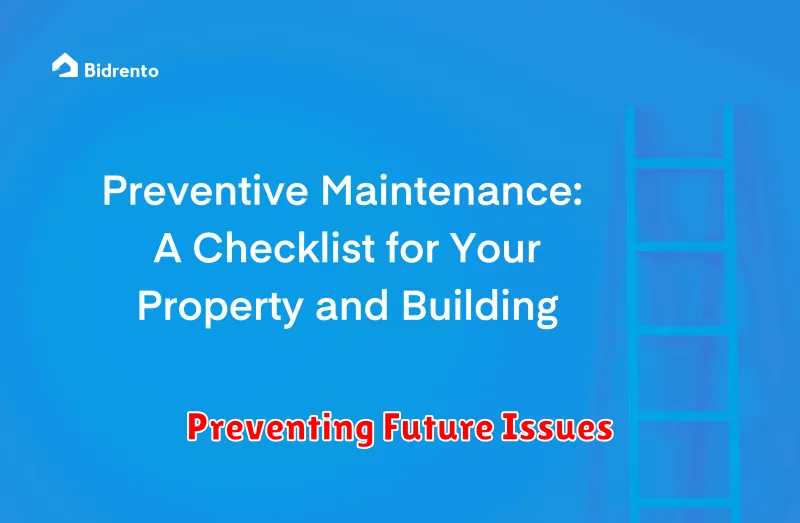
While you can’t predict the future, there are steps you can take to minimize the chance of future repairs. First, keep your apartment clean. This may seem obvious, but dust, dirt, and grime can cause damage over time. Regular cleaning will help extend the life of your appliances and surfaces. Secondly, be mindful of your habits. If you know you tend to spill things, be extra careful in the kitchen and bathroom. If you’re prone to leaving things on the floor, make sure to put things away promptly. These small changes can make a big difference in preventing future issues.
Finally, communication with your landlord is key. If you see any minor issues, such as a loose handle or a leaky faucet, let your landlord know right away. Addressing these issues promptly can prevent them from turning into more serious and costly problems. By taking these steps, you can help keep your apartment in good condition and minimize the need for repairs in the future.
Maintaining a Positive Relationship with Your Landlord
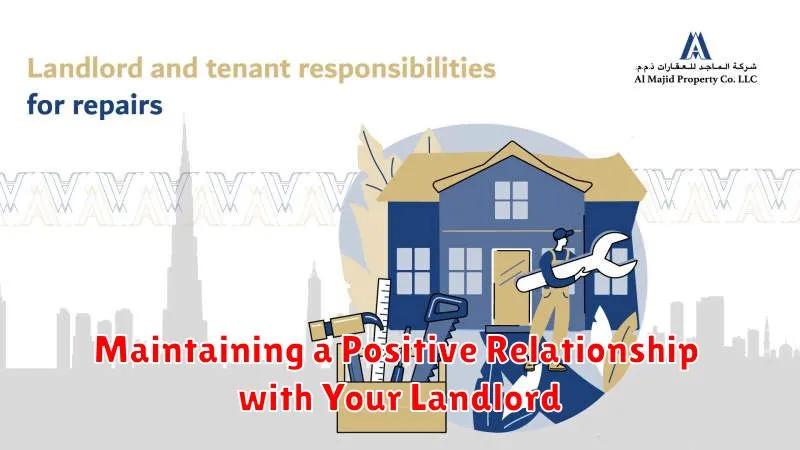
While it can be frustrating to deal with apartment repairs, it’s crucial to remember that your landlord is ultimately responsible for maintaining the property. A good relationship with your landlord can make the process smoother and more pleasant for everyone involved.
First and foremost, communication is key. Always be respectful when contacting your landlord, whether it’s about a minor inconvenience or a serious issue. Clearly explain the problem, provide specific details, and be open to potential solutions.
If you have a regular maintenance request, consider using the same method of contact each time (email, phone call, etc.) for consistency. This helps your landlord stay organized and track your requests.
Lastly, remember that patience is vital. Landlords often have multiple properties and tenants to manage, so repairs may take some time. Be understanding, and if there’s a delay, try to proactively find temporary solutions to the problem.
Documenting All Communication
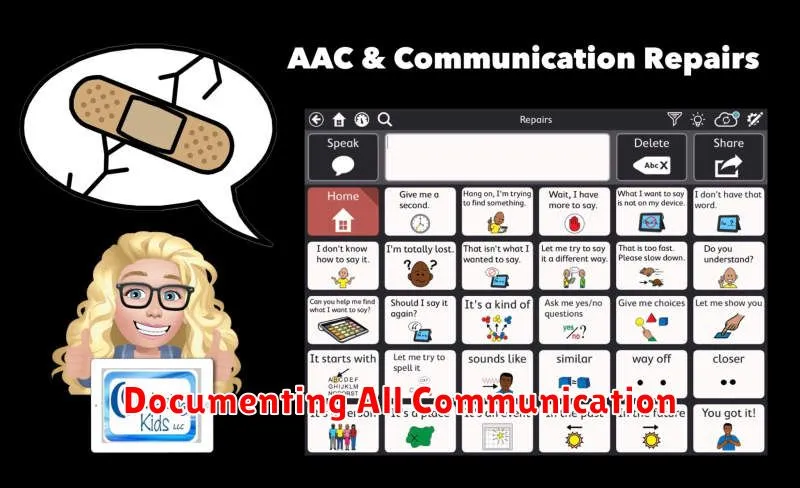
When dealing with repairs, it’s crucial to document all communication with your landlord or property manager. This includes emails, phone calls, text messages, and even in-person conversations. Keep a detailed record of the date, time, content of the conversation, and the name of the person you spoke with.
This documentation serves several purposes:
- Provides evidence: If a dispute arises regarding the repair, you’ll have concrete proof of your request and the landlord’s response.
- Establishes a timeline: It helps track the progress of the repair and shows whether the landlord is responding reasonably.
- Protects your rights: In some cases, your local laws may require landlords to address repairs within a specific timeframe. Documentation helps you prove that the landlord has failed to meet their obligations.
The best way to document communication is to keep a dedicated file or notebook. You can also use a digital notepad or email yourself a summary of each interaction. Remember to keep all records organized and easily accessible.
Knowing Your Local Tenant Laws
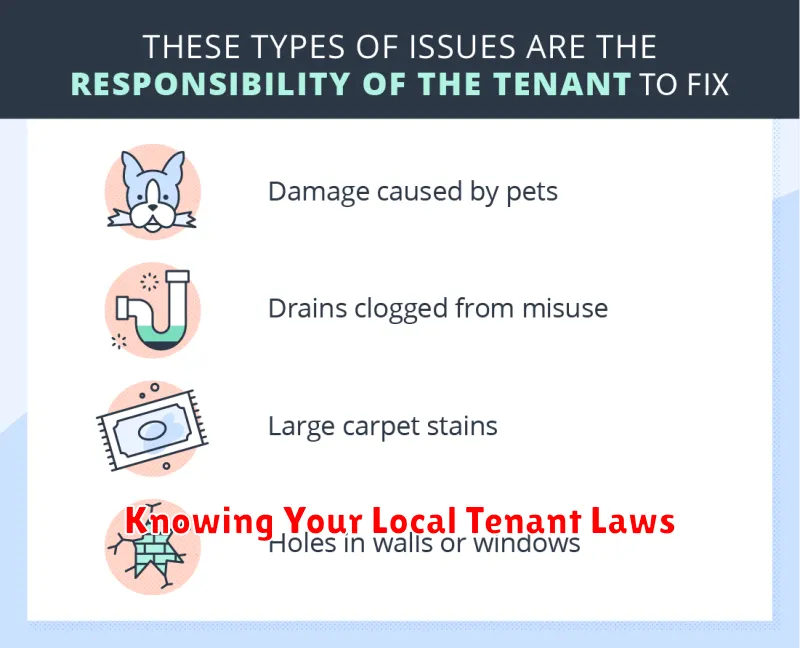
Before taking any action, it’s crucial to understand your rights and responsibilities as a tenant. Familiarize yourself with your local tenant laws, which vary from state to state and even city to city. These laws will outline your landlord’s obligations regarding repairs and maintenance, as well as your rights as a tenant.
Key areas to research include:
- Timeframe for repairs: Laws often specify a reasonable amount of time your landlord has to address repairs.
- Emergency repairs: This usually involves immediate threats to health and safety, such as a burst pipe or lack of heat.
- Repair request methods: Some laws may dictate the proper way to submit a repair request, like written notice.
- Tenant remedies: If your landlord fails to address repairs, what legal recourse do you have? This could include withholding rent, making repairs yourself, or pursuing legal action.
Your local housing authority or legal aid services can provide valuable resources and information about tenant laws in your area. Having this knowledge empowers you to effectively communicate with your landlord and advocate for your rights.
When to Seek Legal Advice

While it’s frustrating to deal with apartment repairs, it’s important to remember that your landlord has legal obligations to maintain a habitable living space. You should first try to work with your landlord through a written request, documenting their responses. If your landlord continues to ignore or delay the repairs, you may want to consider legal advice.
You should seek legal advice if:
- Your landlord is refusing to make necessary repairs that are causing safety hazards or are impacting your health.
- Your landlord is retaliating against you for requesting repairs or reporting issues.
- Your landlord is violating the terms of your lease agreement, such as failing to provide essential services like heat, water, or electricity.
- You have been threatened with eviction without a legal reason.
- You are unsure of your rights and obligations under your lease agreement.
A lawyer can help you understand your rights and options, negotiate with your landlord, and pursue legal action if necessary. They can also help you prevent further problems by ensuring your rights are protected and your landlord is held accountable for their obligations.

